
1
Facts are like cows. If you look them in the face long enough, they generally run away.Dorothy L. Sayers
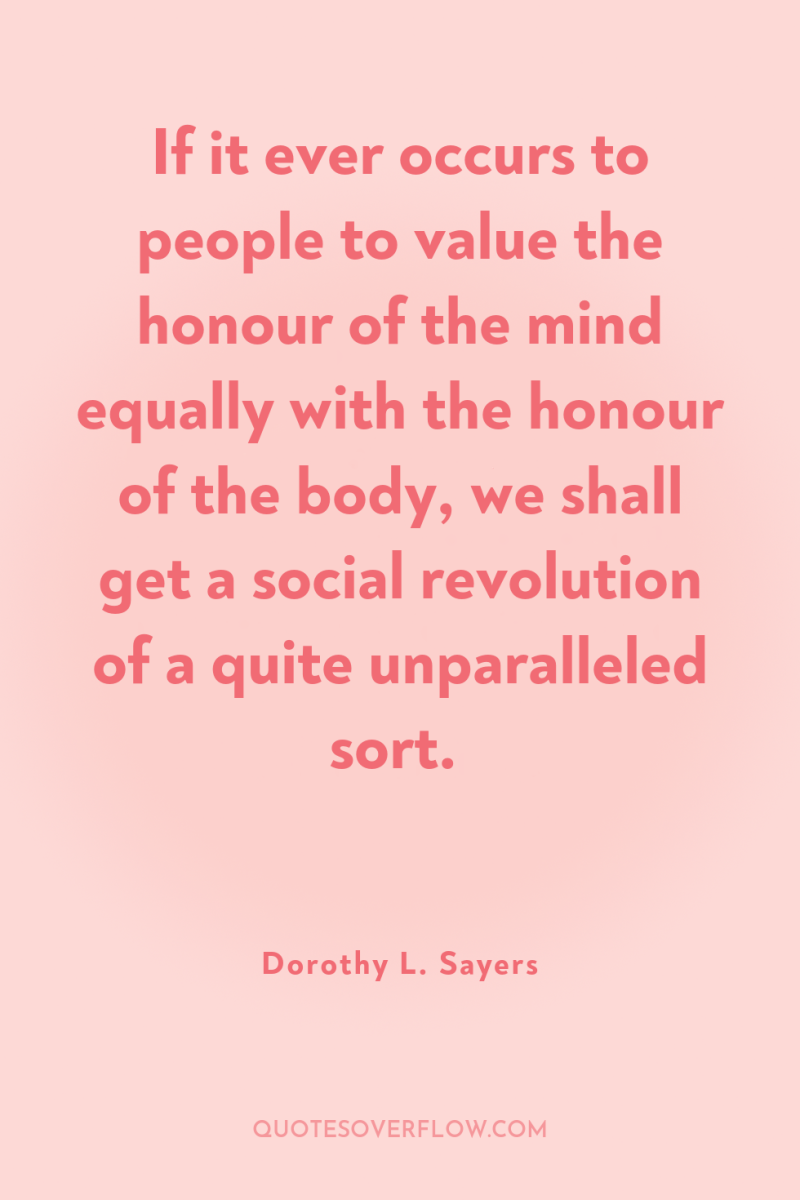
2
If it ever occurs to people to value the honour of the mind equally with the honour of the body, we shall get a social revolution of a quite unparalleled sort.Dorothy L. Sayers
3
The only ethical principle which has made science possible is that the truth shall be told all the time. If we do not penalize false statements made in error, we open up the way for false statements by intention. And a false statement of fact, made deliberately, is the most serious crime a scientist can commit.Dorothy L. Sayers
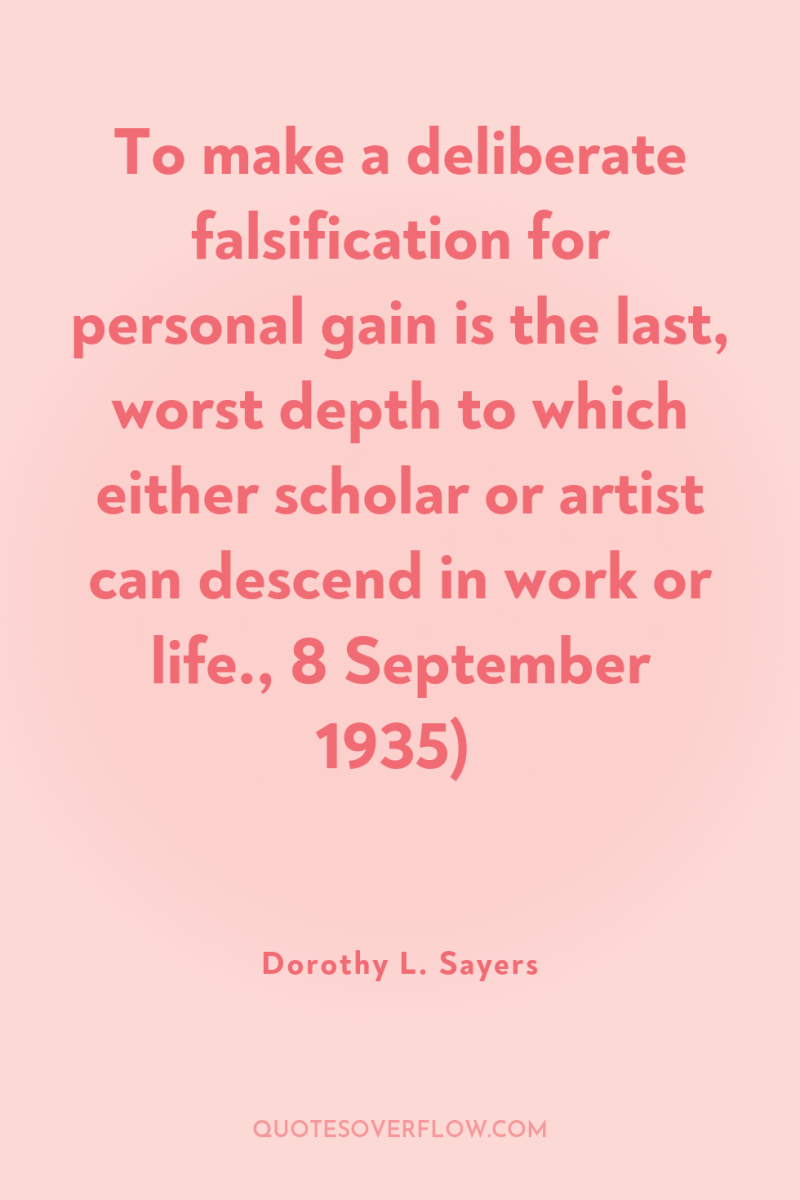
4
To make a deliberate falsification for personal gain is the last, worst depth to which either scholar or artist can descend in work or life., 8 September 1935)Dorothy L. Sayers
5
See that the mind is honest, first; the rest may follow or not as God wills. [That] the fundamental treason to the mind ... is the one fundamental treason which the scholar's mind must not allow is the bond uniting all the Oxford people in the last resort.Dorothy L. Sayers
6
Listen, Harriet. I do unterstand. I know you don't want either to give or to take. . You don't want ever again to have to depend for happiness on another person."" That's true. That's the truest thing you ever said."" All right. I can respect that. Only you've got to play the game. Don't force an emotional situation and then blame me for it."" But I don't want any situation. I want to be left in peace.Dorothy L. Sayers
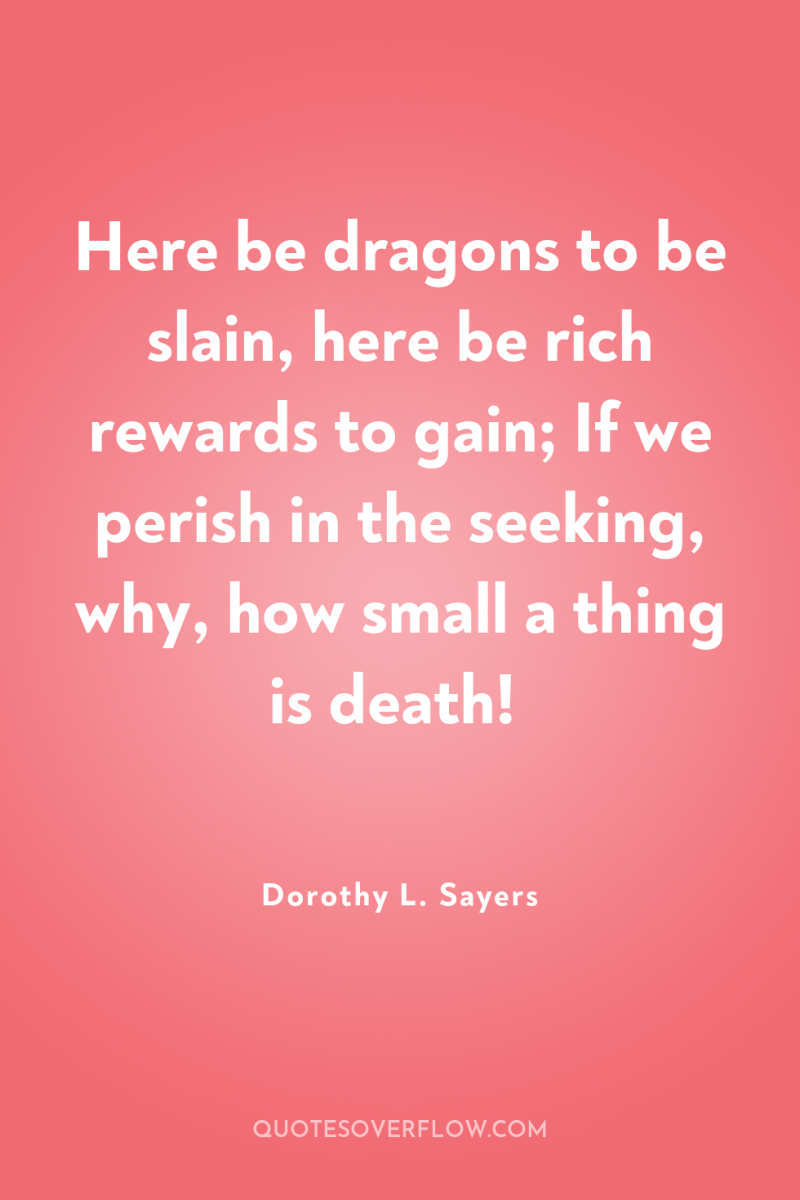
7
Here be dragons to be slain, here be rich rewards to gain; If we perish in the seeking, why, how small a thing is death!Dorothy L. Sayers
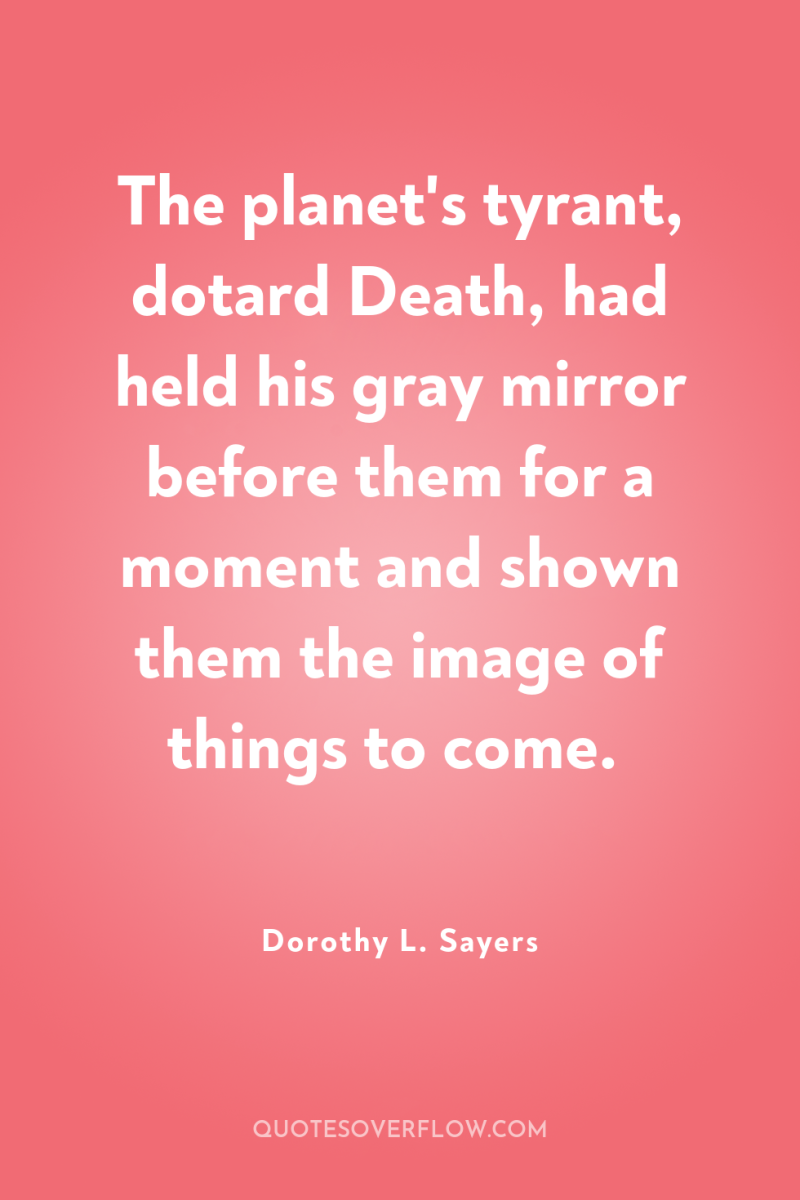
8
The planet's tyrant, dotard Death, had held his gray mirror before them for a moment and shown them the image of things to come.Dorothy L. Sayers

9
How can I find the words? Poets have taken them all and left me with nothing to say or do"" Except to teach me for the first time what they meant.Dorothy L. Sayers
10
A man once asked me. . how I managed in my books to write such natural conversation between men when they were by themselves. Was I, by any chance, a member of a large, mixed family with a lot of male friends? I replied that, on the contrary, I was an only child and had practically never seen or spoken to any men of my own age till I was about twenty-five. "Well, " said the man, "I shouldn't have expected a woman (meaning me) to have been able to make it so convincing." I replied that I had coped with this difficult problem by making my men talk, as far as possible, like ordinary human beings. This aspect of the matter seemed to surprise the other speaker; he said no more, but took it away to chew it over. One of these days it may quite likely occur to him that women, as well as men, when left to themselves, talk very much like human beings also.Dorothy L. Sayers
![[O]ne can scarcely be frightened off writing what one wants...](https://cdn.quotesoverflow.com/file/quotesoverflow/images/one-can-scarcely-be-frightened-off364486540682-1200.webp)
11
[O]ne can scarcely be frightened off writing what one wants to write for fear an obscure reviewer should patronise one on that account.Dorothy L. Sayers
12
This recognition of the truth we get in the artist’s work comes to us as a revelation of new truth. I want to be clear about that. I am not referring to the sort of patronizing recognition we give a writer by nodding our heads and observing, “Yes, yes, very good, very true–that’s just what I’m always saying.” I mean the recognition of a truth that tells us something about ourselves that we had not been always saying, something that puts a new knowledge of ourselves withint our grasp. It is new, startling, and perhaps shattering, and yet it comes to us with a sense of familiarity. We did not know it before, but the moment the poet has shown it to us, we know that, somehow or other, we had always really known it.Dorothy L. Sayers

13
This is the weakness of most 'edifying' or 'propaganda' literature. There is no diversity... You cannot, in fact, give God His due without giving the devil his due also.Dorothy L. Sayers
14
The one thing which seems to me quite impossible is to take into consideration the kind of book one is expected to write; surely one can only write the book that is there to be written., 8 September 1935)Dorothy L. Sayers
15
The making of miracles to edification was as ardently admired by pious Victorians as it was sternly discouraged by Jesus of Nazareth. Not that the Victorians were unique in this respect. Modern writers also indulge in edifying miracles though they generally prefer to use them to procure unhappy endings, by which piece of thaumaturgy they win the title of realists.Dorothy L. Sayers

16
I can't think why fancy religions should have such a ghastly effect on one's grammar. It's a kind of intellectual rot that sets in, I'm afraid.Dorothy L. Sayers

17
The really essential factors of success in any undertaking are money and opportunity, and as a rule, the man who can make the first can make the second.Dorothy L. Sayers
18
What women want as a class is irrelevant. I want to know about Aristotle. It is true that most women care nothing about him, and a great many male undergraduates turn pale and faint at the thought of him-but I, eccentric individual that I am, do want to know about Aristotle, and I submit that there is nothing in my shape or bodily functions which need prevent my knowing about him.Dorothy L. Sayers
19
I am concerned only with the proper training of the mind to encounter and deal with the formidable mass of undigested problems presented to it by the modern world. For the tools of learning are the same, in any and every subject; and the person who knows how to use them will, at any age, get the mastery of a new subject in half the time and with a quarter of the effort expended by the person who has not the tools at his command.Dorothy L. Sayers

20
For the sole true end of education is simply this: to teach men how to learn for themselves and whatever instruction fails to do this is effort spent in vain.Dorothy L. Sayers
21
Has it ever struck you as odd, or unfortunate, that today, when the proportion of literacy is higher than it has ever been, people should have become susceptible to the influence of advertisement and mass propaganda to an extent hitherto unheard of and unimagined?.. Have you ever, in listening to a debate among adult and presumably responsible people, been fretted by the extraordinary inability of the average debater to speak to the question, or to meet and refute the arguments of speakers on the other side?.. And when you think of this, and think that most of our public affairs are settled by debates and committees, have you ever felt a certain sinking of the heart?.. Is not the great defect of our education today---a defect traceable through all the disquieting symptoms of trouble that I have mentioned---that although we often succeed in teaching our pupils "subjects, " we fail lamentably on the whole in teaching them how to think: they learn everything, except the art of learning. .Dorothy L. Sayers

22
To make a deliberate falsification for personal gain is the last, worst depth to which either scholar or artist can descend in work orDorothy L. Sayers
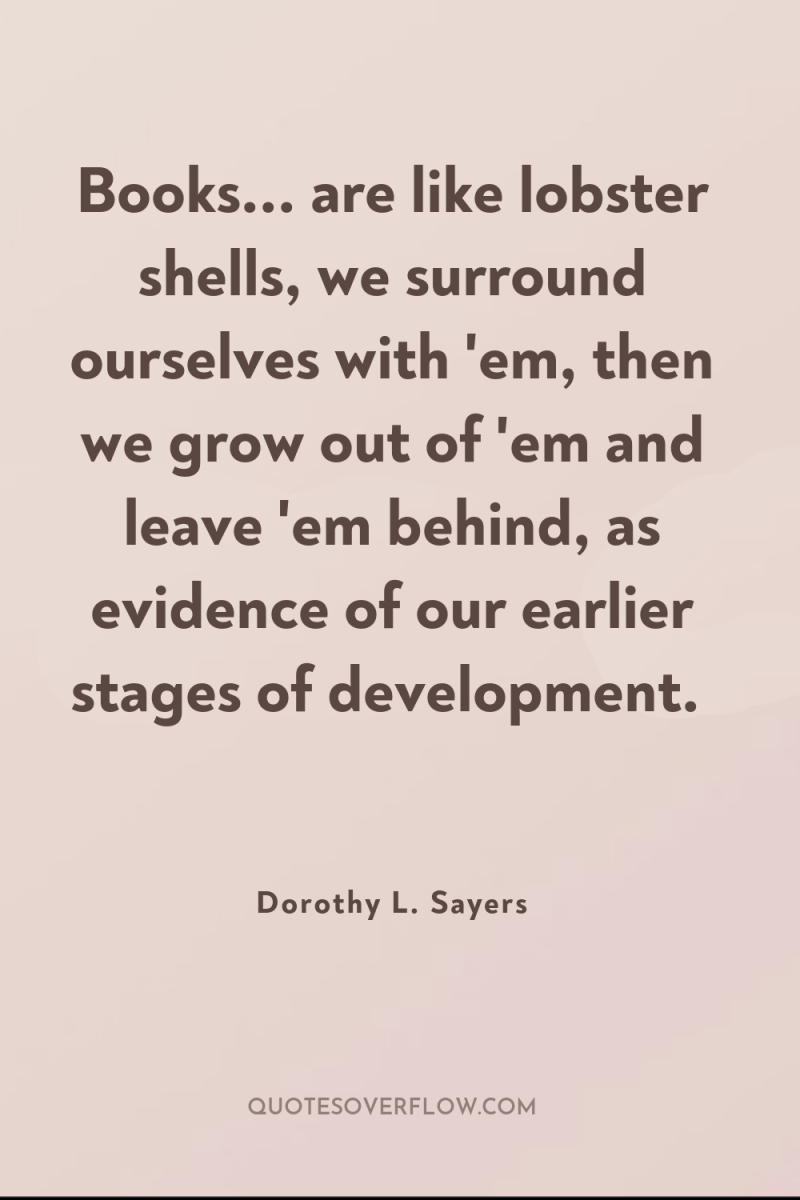
23
Books... are like lobster shells, we surround ourselves with 'em, then we grow out of 'em and leave 'em behind, as evidence of our earlier stages of development.Dorothy L. Sayers
24
It's disquieting to reflect that one's dreams never symbolize one's real wishes, but always something Much Worse... If I really wanted to be passionately embraced by Peter, I should dream of dentists or gardening. I wonder what unspeakable depths of awfulness can only be expressed by the polite symbol of Peter's embraces?Dorothy L. Sayers
25
What we ask is to be human individuals, however peculiar and unexpected. It is no good saying: "You are a little girl and therefore you ought to like dolls"; if the answer is, "But I don't, " there is no more to be said.Dorothy L. Sayers
26
Miss Climpson, " said Lord Peter, "is a manifestation of the wasteful way in which this country is run. Look at electricity, Look at water-power. Look at the tides. Look at the sun. Millions of power units being given off into space every minute. Thousands of old maids, simply bursting with useful energy, forced by our stupid social system into hydros and hotels and communities and hostels and posts as companions, where their magnificent gossip-powers and units of inquisitiveness are allowed to dissipate themselves or even become harmful to the community, while the ratepayers' money is spent on getting work for which these women are providentially fitted, inefficiently carried out by ill-equipped policemen like you.Dorothy L. Sayers
27
Wherever you find a great man, you will find a great mother or a great wife standing behind him -- or so they used to say. It would be interesting to know how many great women have had great fathers and husbands behind them.Dorothy L. Sayers
28
In reaction against the age-old slogan, "woman is the weaker vessel, " or the still more offensive, "woman is a divine creature, " we have, I think, allowed ourselves to drift into asserting that "a woman is as good as a man, " without always pausing to think what exactly we mean by that. What, I feel, we ought to mean is something so obvious that it is apt to escape attention altogether, viz: (..) that a woman is just as much an ordinary human being as a man, with the same individual preferences, and with just as much right to the tastes and preferences of an individual. What is repugnant to every human being is to be reckoned always as a member of a class and not as an individual person.Dorothy L. Sayers
29
The rule seemed to be that a great woman must either die unwed ... or find a still greater man to marry her.... The great man, on the other hand, could marry where he liked, not being restricted to great women; indeed, it was often found sweet and commendable in him to choose a woman of no sort of greatness at all.Dorothy L. Sayers
30
In fact, there is perhaps only one human being in a thousand who is passionately interested in his job for the job's sake. The difference is that if that one person in a thousand is a man, we say, simply, that he is passionately keen on his job; if she is a woman, we say she is a freak.Dorothy L. Sayers
31
[W]hen I see men callously and cheerfully denying women the full use of their bodies, while insisting with sobs and howls on the satisfaction of their own, I simply can't find it heroic, or kind, or anything but pretty rotten and feeble.Dorothy L. Sayers

32
Time and trouble will tame an advanced young woman, but an advanced old woman is uncontrollable by any earthly force.Dorothy L. Sayers
33
[T]he more clamour we make about 'the women's point of view', the more we rub it into people that the women's point of view is different, and frankly I do not think it is -- at least in my job. The line I always want to take is, that there is the 'point of view' of the reasonably enlightened human brain, and that this is the aspect of the matter which I am best fitted to uphold.Dorothy L. Sayers

34
What'll Geoffrey do when you pull off your First, my child?" demanded Miss HaDorothy L. Sayers
35
It is arguable that when Humanists, "Shook off, " as people say, "the trammels of religion, " and discovered things of this world as objects of veneration in their own right.. they began to lose the finer appreciation of even the world itself. Thus to the Christian centuries, the flesh was holy (or sacer at least in one sense or the other), and they veiled its awful majesty; to the Humanist centuries it was divine in its own right, and they exhibited it. Now it is the commonplace of the magazine cover. It has lost its numen. So too with the cult of knowledge for its own sake declining from the Revival of Learning to the Brains Trust.Dorothy L. Sayers
36
That this is really the case was made plain to me by the questions asked me, mostly by young men, about my Canterbury play, The Zeal of Thy House. The action of the play involves a dramatic presentation of a few fundamental Christian dogmas– in particular, the application to human affairs of the doctrine of the Incarnation. That the Church believed Christ to be in any real sense God, or that the eternal word was supposed to be associated in any way with the word of creation; that Christ was held to be at the same time man in any real sense of the word; that the doctrine of the Trinity could be considered to have any relation to fact or any bearing on psychological truth; that the Church considered pride to be sinful, or indeed took notice of any sin beyond the more disreputable sins of the flesh–all these things were looked upon as astonishing and revolutionary novelties, imported into the faith by the feverish imagination of a playwright. I protested in vain against this flattering tribute to my powers of invention, referring my inquirers to the creeds, to the gospels, and to the offices of the Church; I insisted that if my play were dramatic it was so, not in spite of the dogma, but because of it–that, in short, the dogma was the drama. The explanation was, however, not well received; it was felt that if there were anything attractive in Christian philosophy I must have put it there myself.Dorothy L. Sayers
37
It will be sent that, although the writer's love is verily a jealous love, it is a jealousy for and not of his creatures. He will tolerate no interference either with them or between them and himself.Dorothy L. Sayers
38
That a work of creation struggles and insistently demands to be brought into being is a fact that no genuine artist would think of denying.Dorothy L. Sayers
39
A marriage of two independent and equally irritable intelligences seems to me reckless to the point of insanity.Dorothy L. Sayers
40
I sleuth, you know. For a hobby. Harmless outlet for natural inquisitiveness, don't you see, which might otherwise strike inward and produce introspection an' suicide. Very natural, healthy pursuit -- not too strenuous, not too sedentary; trains and invigorates the mind.Dorothy L. Sayers
41
I suppose one oughtn’t to marry anybody, unless one’s prepared to make him a full-time job.”“ Probably not; though there are a few rare people, I believe, who don’t look on themselves as jobs but as fellow creatures.Dorothy L. Sayers
42
Oh, well, faint heart never won so much as a scrap of paperDorothy L. Sayers
43
You'd think (losing his job and degree for having made false claims as a researcher) would be a lesson to him, " said Miss Hillyard. "It didn't pay, did it? Say he sacrificed his professional honour for the women and children we hear so much about -- but in the end it left him worse of." But that, " said Peter, "was only because he committed the extra sin of being found out.Dorothy L. Sayers
44
And upon his return, Gherkins, who had always considered his uncle as a very top-hatted sort of person, actually saw him take from his handkerchief-drawer an undeniable automatic pistol. It was at this point that Lord Peter was apotheosed from the state of Quite Decent Uncle to that of Glorified UncleDorothy L. Sayers
45
I am occasionally desired by congenital imbeciles and the editors of magazines to say something about the writing of detective fiction “from the woman’s point of view.” To such demands, one can only say “Go away and don’t be silly. You might as well ask what is the female angle on an equilateral triangle.Dorothy L. Sayers
46
It is a formidable list of jobs: the whole of the spinning industry, the whole of the dyeing industry, the whole of the weaving industry. The whole catering industry and–which would not please Lady Astor, perhaps–the whole of the nation’s brewing and distilling. All the preserving, pickling and bottling industry, all the bacon-curing. And (since in those days a man was often absent from home for months together on war or business) a very large share in the management of landed estates. Here are the women’s jobs–and what has become of them? They are all being handled by men. It is all very well to say that woman’s place is the home–but modern civilisation has taken all these pleasant and profitable activities out of the home, where the women looked after them, and handed them over to big industry, to be directed and organised by men at the head of large factories. Even the dairy-maid in her simple bonnet has gone, to be replaced by a male mechanic in charge of a mechanical milking plant. .Dorothy L. Sayers
47
The more genuinely creative [the writer] is, the more he will want his work to develop in accordance with its own nature, and to stand independent of himselfDorothy L. Sayers
48
[N]othing about a book is so unmistakable and so irreplaceable as the stamp of the cultured mind. I don't care what the story is about or what may be the momentary craze for books that appear to have been hammered out by the village blacksmith in a state of intoxication; the minute you get the easy touch of the real craftsman with centuries of civilisation behind him, you get literature.Dorothy L. Sayers
49
Has it ever struck you as odd, or unfortunate, that today, when the proportion of literacy is higher than it has ever been, people should have become susceptible to the influence of advertisement and mass propaganda to an extent hitherto unheard of and unimagined?Dorothy L. Sayers
50
Forgiveness does not wipe away the consequences of the sin. The consequences are borne by somebody.Dorothy L. Sayers
51
But that's men all over ... Poor dears, they can't help it. They haven't got logical minds.Dorothy L. Sayers
52
He was being about as protective as a can-opener.Dorothy L. Sayers
53
[On marriage and permanent attachDorothy L. Sayers
54
I have the most ill-regulated memory. It does those things which it ought not to do and leaves undone the things it ought to have done. But it has not yet gone on strike altogether.Dorothy L. Sayers
55
Perhaps [the critics are right and] the drama is played out now and Jesus is safely dead and buried. Perhaps. It is ironical and entertaining to consider that at least once in the world’s history those words might have been said with complete conviction, and that was on the eve of the Resurrection.Dorothy L. Sayers
56
For whatever reason God chose to make man as he is– limited and suffering and subject to sorrows and death– He had the honesty and the courage to take His own medicine. Whatever game He is playing with His creation, He has kept His own rules and played fair. He can exact nothing from man that He has not exacted from Himself. He has Himself gone through the whole of human experience, from the trivial irritations of family life and the cramping restrictions of hard work and lack of money to the worst horrors of pain and humiliation, defeat, despair and death. When He was a man, He played the man. He was born in poverty and died in disgrace and thought it well worthwhile.Dorothy L. Sayers
57
The only Christian work is good work well done.Dorothy L. Sayers
58
There is, in fact, a paradox about working to serve the community, and it is this: that to aim directly at serving the community is to falsify the work; the only way to serve the community is to forget the community and serve the work.Dorothy L. Sayers
59
At present we have no clear grasp of the principle that every man should do the work for which he is fitted by nature!Dorothy L. Sayers
60
Don't be so damned discouraging, " said Wimsey. "I have already carefully explained to you that this time I am investigating this business. Anybody would think you had no confidence in me."" People have been wrongly condemned before now."" Exactly; simply because I wasn't there."" I never thought of that.Dorothy L. Sayers
61
She suddenly saw Wimsey in a new light. She knew him to be intelligent, clean, courteous, wealthy, well-read, amusing and enamored, but he had not so far produced in her that crushing sense of inferiority which leads to prostration and hero-worship. But she now realized that there was, after all, something godlike about him. He could control a horse.Dorothy L. Sayers
62
I looked for any footmarks of course, but naturally, with all this rain, there wasn't a sign. Of course, if this were a detective story, there'd have been a convenient shower exactly an hour before the crime and a beautiful set of marks which could only have come there between two and three in the morning, but this being real life in a London November, you might as well expect footprints in Niagara. I searched the roofs right along–and came to the jolly conclusion that any person in any blessed flat in the blessed row might have done it.Dorothy L. Sayers
63
Lord Peter was hampered in his career as a private detective by a public school education. Despite Parker's admonitions, he was not always able to discount it. His mind had been warped in its young growth by "Raffles" and "Sherlock Holmes, " or the sentiments for which they stand. He belonged to a family which had never shot a fox. 'I am an amateur, ' said Lord PeterDorothy L. Sayers
64
…After all, it isn't really difficult to write books. Especially if you either write a rotten story in good English or a good story in rotten English, which is as far as most people seem to get nowadays.Dorothy L. Sayers
65
She had her image… and anything added to that would be mere verse-making. Something might come of it some day. In the meanwhile she had got her mood on to paper–and this is the release that all writers, even the feeblest, seek for as men seek for love; and, having found it, they doze off happily into dreams and trouble their hearts no further.Dorothy L. Sayers
66
I imagine you come across a number of people who are disconcerted by the difference between what you do feel and what they fancy you ought to feel. It is fatal to pay the smallest attention to them.Dorothy L. Sayers
67
I imagine you come across a number of people who are disconcerted by the difference between what you do feel and what they fancy you ought to feel. It is fatal to pay the smallest attention to them.”“ Yes, ” said Harriet, “but I am one of them. I disconcert myself very much. I never know what I do feel.”“ I don’t think that matters, provided one doesn’t try to persuade one’s self into appropriate feelings. .Dorothy L. Sayers
68
Some people's blameless lives are to blame for a good deal.Dorothy L. Sayers
69
The rest were nondescript, as yet undifferentiated–yet nondescripts, thought Harriet, were the most difficult of all human beings to analyze. You scarcely knew they were there, until–bang! Something quite unexpected blew up like a depth charge and left you marveling, to collect strange floating debris.Dorothy L. Sayers
70
A facility for quotation covers the absence of original thought.Dorothy L. Sayers
71
Nothing goes so well with a hot fire and buttered crumpets as a wet day without and a good dose of comfortable horrors within. The heavier the lashing of the rain and the ghastlier the details, the better the flavour seems to be.Dorothy L. Sayers
72
Parker looked distressed. He had confidence in Wimsey's judgment, and, in spite of his own interior certainty, he felt shaken." My dear man, where's the flaw in [this case]?"" There isn't one ... There's nothing wrong about it at all, except that the girl's innocent.Dorothy L. Sayers
73
But if you were investigating a crime, ” said Lady Swaffham, “you’d have to begin by the usual things, I suppose – finding out what the person had been doing, and who’d been to call, and looking for a motive, wouldn’t you?”“ Oh, yes, ” said Lord Peter, “but most of us have such dozens of motives for murderin’ all sorts of inoffensive people. There’s lots of people I’d like to murder, wouldn’t you?”“ Heaps, ” said Lady Swaffham.Dorothy L. Sayers
74
The departure of the church-going element had induced a more humanitarian atmosphere.Dorothy L. Sayers
75
You're thinking that people don't keep up old jealousies for twenty years or so. Perhaps not. Not just primitive, brute jealousy. That means a word and a blow. But the thing that rankles is hurt vanity. That sticks. Humiliation. And we've all got a sore spot we don't like to have touched.Dorothy L. Sayers
76
People who prefer to believe the worst of others will breed war and religious persecutions while the world lasts.Dorothy L. Sayers
77
If God made everything, did He make the Devil?' This is the kind of embarrassing question which any child can ask before breakfast, and for which no neat and handy formula is provided in the Parents' Manual…Later in life, however, the problem of time and the problem of evil become desperately urgent, and it is useless to tell us to run away and play and that we shall understand when we are older. The world has grown hoary, and the questions are still unanswered.Dorothy L. Sayers
78
The characteristic common to God and man is apparently that: the desire and the ability to make things.Dorothy L. Sayers
79
Once lay down the rule that the job comes first and you throw that job open to every individual, man or woman, fat or thin, tall or short, ugly or beautiful, who is able to do that job better than the rest of the world.Dorothy L. Sayers
80
Do you know how to pick a lock?"" Not in the least, I'm afraid."" I often wonder what we go to school for, " said Wimsey.Dorothy L. Sayers
81
Salcombe Hardy groaned: "How long, O Lord, how long shall we have to listen to all this tripe about commercial arsenic? Murderers learn it now at their mother's knee.Dorothy L. Sayers
82
(One character on another:)" Don't you know that I passionately dote on every chin on his face?Dorothy L. Sayers
83
Persons curious in chronology may, if they like, work out from what they already know of the Wimsey family that the action of the book takes place in 1935; but if they do, they must not be querulously indignant because the King's Jubilee is not mentioned, or because I have arranged the weather and the moon's changes to suit my own fancy. For, however realistic the background, the novelist's only native country is Cloud-Cuckooland, where they do but jest, poison in jest: no offence in the world.Dorothy L. Sayers
84
We may properly and profitably amuse ourselves by distinguishing those writers who are respectively 'father-ridden, ' 'son-ridden, ' and 'ghost-ridden.' It is the mark of the father-ridden that they endeavor to impose the idea directly upon the mind and senses, believing that his is the whole of the work.. Among the son-ridden, we may place such writers as Swinburne, in whom the immense ingenuity and sensuous loveliness of the manner is developed out of all proportion to the tenuity of the ruling idea.. The ghost-ridden writer, on the other hand, conceives that the emotion which he feels is in itself sufficient to awaken response, without undergoing discipline of a thorough incarnation, and without the coherence that derives from reference to a controlling idea.. It may serve as a starting point to say that, whereas failure in the father may be roughly summed up as a failure of thought and a failure in the son is a failure in action, failure in the ghost is a failure in wisdom--not the wisdom of the brain, but the more intimate and instinctive wisdom of the heart and bowels. .Dorothy L. Sayers
85
Isn't the writing of good prose an emotional excitement?"" Yes, of course it is. At least, when you get the thing dead right and know it's dead right, there's no excitement like it. It's marvelous. It makes you feel like God on the Seventh Day — for a bit, anyhow.Dorothy L. Sayers
86
We are much too much inclined in these days to divide people into permanent categories, forgetting that a category only exists for its special purpose and must be forgotten as soon as that purpose is served.Dorothy L. Sayers
87
There is something about wills which brings out the worst side of human nature. People who under ordinary circumstances are perfectly upright and amiable, go as curly as corkscrews and foam at the mouth, whenever they hear the words 'I devise and bequeath.Dorothy L. Sayers
88
She reflected she must be completely besotted with Peter, if his laughter could hallow an aspidistra.Dorothy L. Sayers
89
For God's sake, let's take the word 'possess' and put a brick round its neck and drown it ... We can't possess one another. We can only give and hazard all we have.Dorothy L. Sayers
90
In the linked arms of Bacchus and Aphrodite.Dorothy L. Sayers
91
Heaven deliver us, what's a poet? Something that can't go to bed without making a song about it.Dorothy L. Sayers
92
Lord Peter's library was one of the most delightful bachelor rooms in London. Its scheme was black and primrose; its walls were lined with rare editions, and its chairs and Chesterfield sofa suggested the embraces of the houris. In one corner stood a black baby grand, a wood fire leaped on a wide old-fashioned hearth, and the Sèvres vases on the chimneypiece were filled with ruddy and gold chrysanthemums. To the eyes of the young man who was ushered in from the raw November fog it seemed not only rare and unattainable, but friendly and familiar, like a colourful and gilded paradise in a mediæval painting.Dorothy L. Sayers
93
Philip wasn't the sort of man to make a friend of a woman. He wanted devotion. I gave him that. I did, you know. But I couldn't stand being made a fool of. I couldn;t stand being put on probation, like an office-boy, to see if I was good enough to be condescended to. I quite thought he was honest when he said he didn't believe in marriage -- and then it turned out that it was a test, to see whether my devotion was abject enough. Well, it wasn't. I didn't like having matrimony offered as a bad-conduct prize.Dorothy L. Sayers
94
.. I should wish to add, as a tribute to the great merits of your lordship's cellar, that, although I was obliged to drink a somewhat large quantity both of the Cockburn '68 and the 1800 Napoleon I feel no headache or other ill effects this morning. Trusting that your lordship is deriving real benefit from the country air, and that the little information I have been able to obtain will prove satisfactory, I remain, With respectful duty to all the family, their ladyships, Obediently yours, MERVYN BUNTER.  "Y'know, " said Lord Peter thoughtfully to himself, "I sometimes think Mervyn Bunter's pullin' my leg. .Dorothy L. Sayers
95
I give you full credit for the discovery, I crawl, I grovel, my name is Watson, and you need not say what you were just going to say, because I admit it all.Dorothy L. Sayers
96
Why would you family think about it?"" Oh, my mother's the only one that counts, and she likes you very much from what she's seen of you."" So you had me inspected?"" No-dash ti all, I seem to be saying all the wrong things today. I was absolutely stunned that first day in court, and I rushed off to my mater, who's an absolute dear, and the kind of person who really understands things, and I said, 'Look here! here's the absolutely one and only woman, and she's being put through a simply ghastly awful business and for God's sake come and hold my hand! ' You simply don't know how foul it was.Dorothy L. Sayers
97
Lord Peter Wimsey: Facts, Bunter, must have facts. When I was a small boy, I always hated facts. Thought they were nasty, hard things, all nobs. Mervyn Bunter: Yes, my lord. My old mother always used to say.. Lord Peter Wimsey: Your mother, Bunter? Oh, I never knew you had one. I always thought you just sort of came along already-made, so it were. Oh, excuse me. How infernally rude of me. Beg pardon, I'm sure. Mervyn Bunter: That's all right, my lord. Lord Peter Wimsey: Thank you. Mervyn Bunter: Yes indeed, I was one of seven. Lord Peter Wimsey: That is pure invention, Bunter, I know better. You are unique. But you were going to tell me about your mater. Mervyn Bunter: Oh yes, my lord. My old mother always used to say that facts are like cows. If you stare them in the face hard enough, and they generally run away. Lord Peter Wimsey: By Jove, that's courageous, Bunter. What a splendid person she must be. Mervyn Bunter: I think so, my lord. .Dorothy L. Sayers
98
In the world it is called Tolerance, but in hell it is called Despair...the sin that believes in nothing, cares for nothing, seeks to know nothing, interferes with nothing, enjoys nothing, hates nothing, finds purpose in nothing, lives for nothing, and remains alive because there is nothing for which it will die.Dorothy L. Sayers
99
He remembered having said to his uncle (with a solemn dogmatism better befitting a much younger man): "Surely it is possible to love with the head as well as the heart." Mr. Delagardie had replied, somewhat drily: "No doubt; so long as you do not end by thinking with your entrails instead of your brain.Dorothy L. Sayers
100
People who make some other person part of their job are dangerous.Dorothy L. Sayers